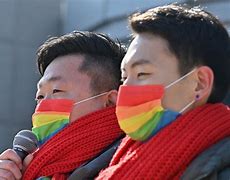Seoul, July 19: In a landmark ruling for gay rights, South Korea’s Supreme Court declared on Thursday that same-sex couples qualify for national health insurance dependent coverage. This decision, celebrated by rights activists, is seen as a potential gateway to legalising same-sex marriage in the country.
The court’s ruling allows same-sex couples to register their partners as dependents for national health insurance, similar to the benefits enjoyed by married couples or those in common-law marriages. This marks a significant step in a nation where many benefits are denied to couples outside traditional family norms.
The country’s highest court ruled that denying a same-sex couple dependent coverage solely based on their gender constitutes serious discrimination, infringing upon citizens’ dignity, values, rights to pursue happiness, freedom of privacy, and equality under the law.
The case was brought forward by So Seong-wook, who filed a complaint in 2021 after his request to register as a dependent of his partner, Kim Yong-min, was denied by South Korea’s health insurance service. The service’s rejection, which required So to pay a separate monthly insurance premium, was initially upheld by a district court. However, an appeals court overturned this decision in February of last year, saying that while So and Kim’s union did not qualify as a common-law marriage under South Korean law, they should still be eligible for dependent coverage.
The Supreme Court’s endorsement of the appeals court ruling emphasised that same-sex couples form an “economic cohabitation tantamount to” married and common-law couples.
“I hope today’s ruling will serve as a stepping stone toward enabling sexual minorities to gain equality in the system of marriage,” So said in a news conference.
Kim, who has long referred to himself as So’s ‘husband’ and ‘companion’ without legal recognition, shared his joy: “I am so happy that the court recognised some of that today.”
Borang Jang, an East Asia researcher at Amnesty International, hailed the ruling as historic. “The court has taken a significant step towards dismantling systemic discrimination and ensuring inclusivity for all,” she stated.
“The case itself is a sobering reminder of the lengthy judicial processes that same-sex couples must endure to secure basic rights that should be universally guaranteed,” she added.




